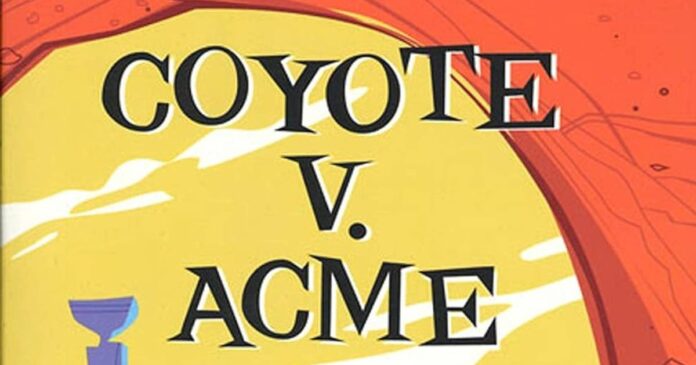There is a piece of writing that I find so funny in the dozen or so times I’ve attempted to read it aloud — almost always to an audience of students — I cannot get through the entire thing without breaking into laughter.
The piece is “Coyote v. Acme” written by Ian Frazier, first published in The New Yorker in 1990, and later as part of Frazier’s collection of short humor of the same title. The piece is written in the form of an opening statement by Harold Schoff, attorney for Wile E. Coyote in Mr. Coyote’s lawsuit against the Acme Corporation for the repeated failure of Acme’s products to aid Mr. Coyote in his pursuit of the Roadrunner, many failures that resulted in “bodily harm” to Mr. Coyote, including:
1. Severe singeing of the hair on the head, neck, and muzzle.
2. Sooty discoloration.
3. Fracture of the left ear at the stem, causing the ear to dangle in the aftershock with a creaking noise.
4. Full or partial combustion of whiskers, producing kinking, frazzling and ashy disintegration.
5. Radical widening of the eyes, due to brow and lid charring.
The deadpan tone of the opening statement juxtaposed against the absurdity of Wile E. Coyote’s predicaments just kills me every time. I giggle just thinking about it.
:quality(70)/cloudfront-us-east-1.images.arcpublishing.com/tronc/TXV4GS6E7ZA6DO7K3XBBUPECPQ.jpg)
So, imagine my excitement to find out that a film adaptation (“Coyote vs. Acme”) of the piece coming out of the Looney Toon studios, combining live action and animation, had been completed and was receiving positive pre-release buzz.
Imagine my disappointment when it was announced that Looney Toons parent company, Warner Bros., was going to shelve the film in order to claim a $30 million tax write-off, a move they’d pulled twice previously with “Batgirl” and “Scoob! Holiday Haunt.”
We’re talking about a movie, fully completed, starring John Cena and Will Forte that Warner Bros. was going to effectively permanently seal off from audiences.
This is perfectly legal.
It shouldn’t be. It seems awfully dumb to have a system in which it pays more to create and bury entertainment than share it with audiences.
I can think of two possible alternatives. One I’m borrowing from publishing. If you are an author of a book that a publisher decides to take out of print and stop distributing — a situation I’m sadly quite familiar with — the rights return to the author for them to do with as they see fit. In my case, that means nothing, but at least in theory I could resell the rights or decide to print and distribute a book on my own.
The other route is predicated on the notion that what the public pays for, the public retains a stake in. Given that the $30 million tax credit comes out of our collective bottom line, films like this shelved by the studios should — at least in theory — pass into the public domain.
In the case of “Coyote vs. Acme” there’s a happy ending, as public approbation led Warner Bros. to reverse course and pursue selling the rights to other companies to distribute the film, which means we’re likely be able to see the results.
But this is a loophole that needs closing so creators, performers and crew who don’t have such a groundswell of support behind them don’t see their hard work deep-sixed by a studio looking for a quick payoff.
Congressman Joaquin Castro of Texas has vowed to start hearings on the issue, saying that the practice is akin to burning down a building for insurance money.
May the hearings be swift, fair and protect the rights of people over this kind of profit.
John Warner is the author of “Why They Can’t Write: Killing the Five-Paragraph Essay and Other Necessities.”
Book recommendations from the Biblioracle
John Warner tells you what to read based on the last five books you’ve read.
1. “Praesidium: Shadows in the Wind (Book One)” by McKinley Aspen
2. “Cogitatio: Shadows in the Wind (Book Two)” by McKinley Aspen
3. “Like Lions” by Brian Panowich
4. “Saved by Hope” by Jenny Lowe
5. “Nicholas Eternal” by Kim Conrey
— Patricia F., Addison, IL
I think “The Eyre Affair” by Jasper Fforde has the right mix of fun, fantasy and mystery to appeal to Patricia.
1. “Flight Behavior” by Barbara Kingsolver
2. “The Lady in the Lake” by Raymond Chandler
3. “The Adventure of the Peculiar Protocols” by Nicholas Meyer
4. “The Stranger in the Lifeboat” by Mitch Albom
5. “Muse” by Brittany Cavallaro
— Sharon K., Indian Head Park, IL
I’m going to recommend Laura Lippman’s Chandleresque novel set in 1960′s Baltimore that flips Chandler’s premise on its head and has a very similar title, “Lady in the Lake.”
1. “We Don’t Know Ourselves: A Personal History of Modern Ireland” by Fintan O’Toole
2. “Myth America: Historians Take on the Biggest Legends and Lies About Our Past” edited by Kevin Kruse and Julian Zelizer
3. “The World According to Garp” by John Irving
4. “I Have Some Questions for You” by Rebecca Makkai
5. “Vacationland” by John Hodgman
— Sean G., Highwood, IL
For Sean I’m suggesting a wryly humorous novel of human foibles, Richard Ford’s “The Sportswriter.”
Get a reading from the Biblioracle
Send a list of the last five books you’ve read and your hometown to [email protected].



